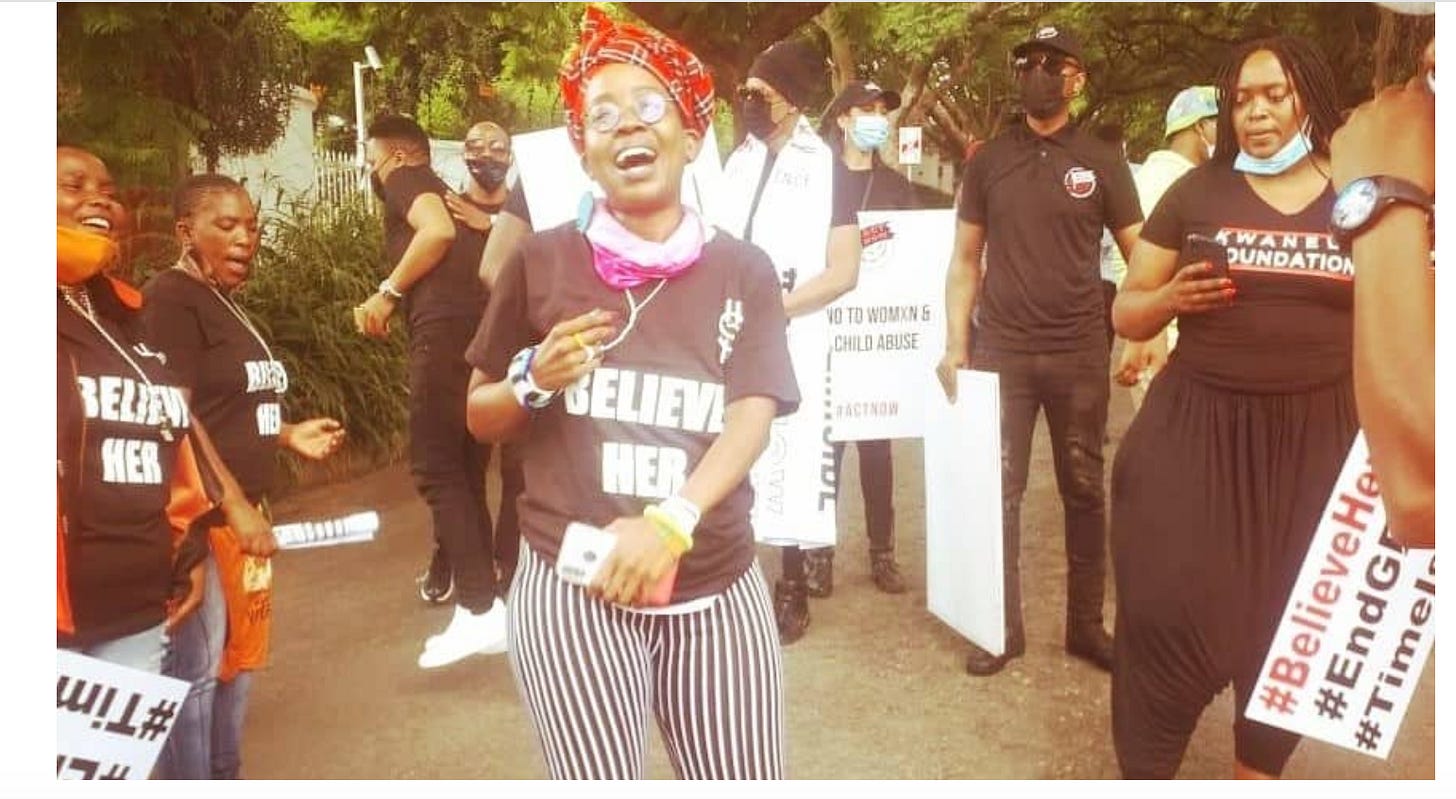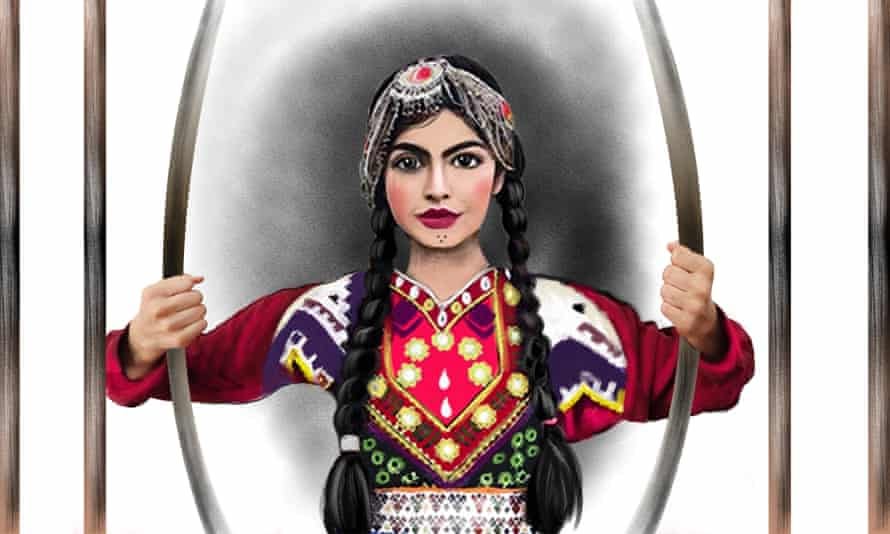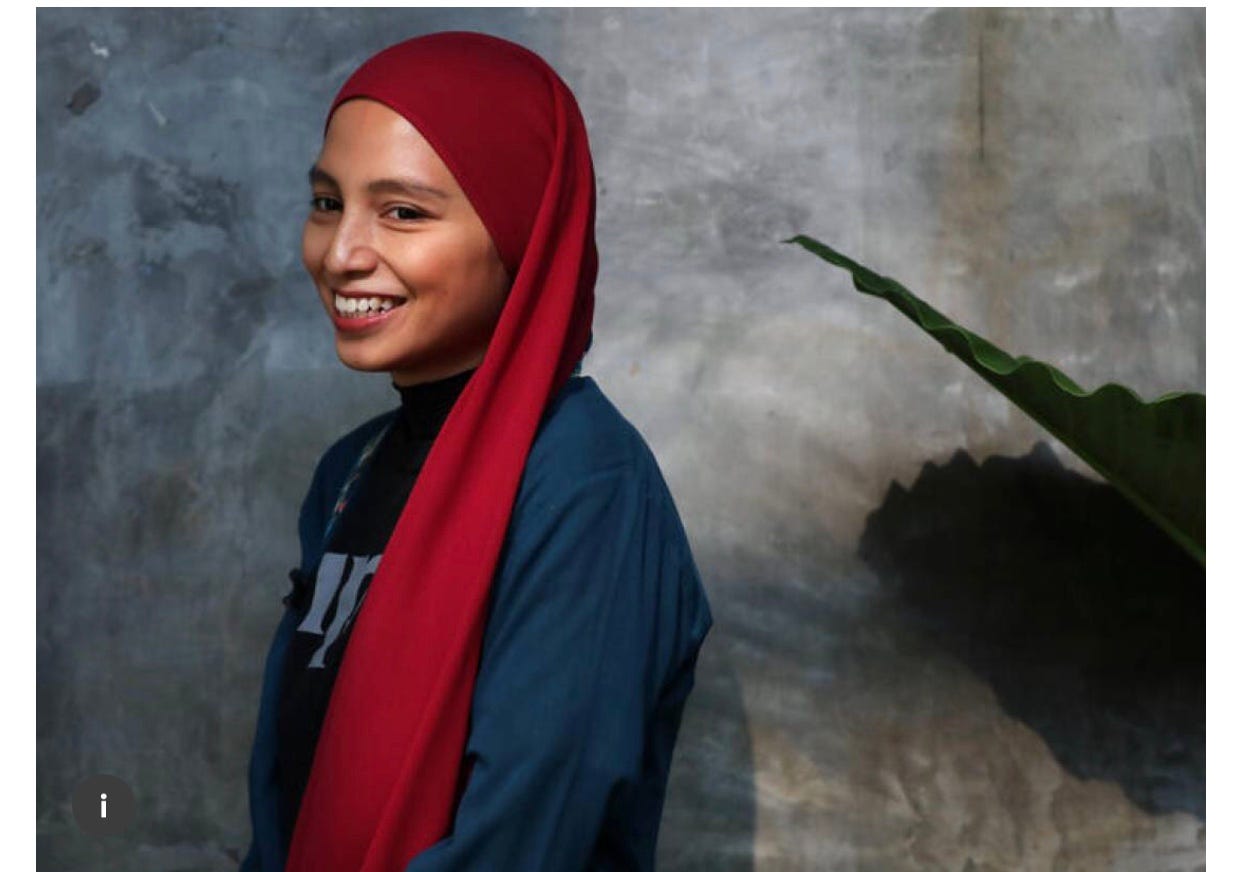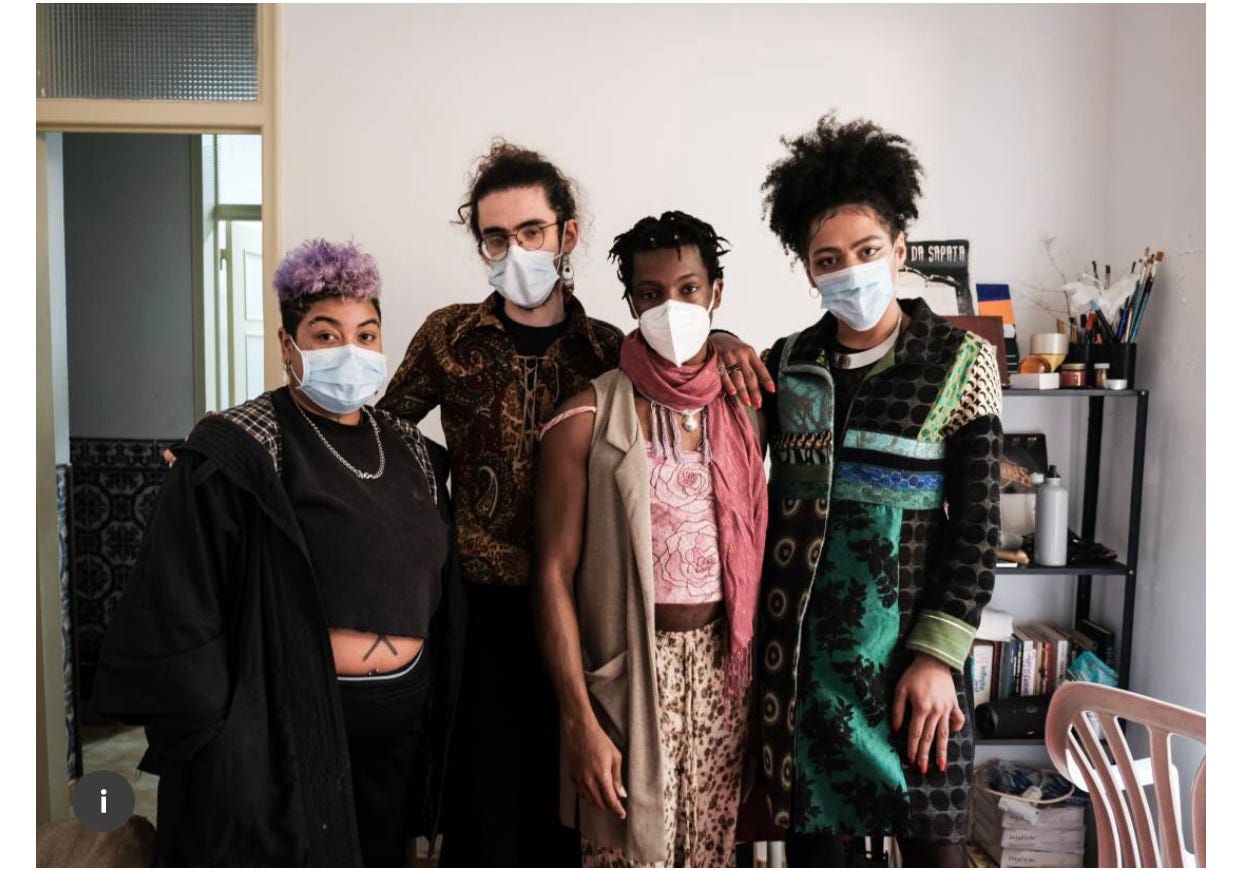Global Roundup: Women against Misogynist Mexican President, Rape Culture in South Africa, First Female Animator in Afghanistan, Sexual Health in Malaysia, and Black Trans Migrant Music Stars
Compiled by Samiha Hossain
Graffiti saying “AMLO is complicit,” referring to President Andres Manual López Obrador of Mexico, outside the National Palace in Mexico City. He and his party have been criticized for supporting a candidate accused of rape.Credit...Rebecca Blackwell/Associated Press
tw: rape, sexual assault
Mexico’s President Andrés Manuel López Obrador has recently come under fire, as his party nominated a man who has been accused by five women of rape and sexual harassment as candidate for governor of Guerrero State. Félix Salgado Macedonio has been accused of raping a then 17-year-old in her home in 1998, sexually harassing a woman in 2007, and drugging and beating another woman in 2016.
Protests quickly followed when these allegations surfaced. A majority of Mexicans believe that López Obrador should withdraw his support for Salgado’s candidacy. Within López Obrador’s own Morena party, over 100 senators and deputies demanded the withdrawal of the nomination. Female Morena members are also questioning his leadership. López Obrador, however, stands by his nomination.
López Obrador believes Mexico’s poverty and gender inequality is rooted in decades of corruption in the government that protects a group of powerful businessmen. He does not believe in feminism, nor tackling the country’s ingrained misogyny. The author of the essay, Viridiana Ríos, argues against this rationale. While she agrees with López Obrador’s criticisms of the political and economic elites, she does not think women’s abuse will simply end if wealth is redistributed. She cites women’s increasing poverty in Mexico: 32 million women are poor — 10 percent more than the number of men. Women in white-collar jobs continue to earn less than men.
We must change our tactics and stop wasting our energy trying to convince Mr. López Obrador that our fight against sexual violence and for gender equality is legitimate and essential. Many leftist women and politicians from his Morena party are also wasting valuable time on this uphill battle – Viridiana Ríos
Rios believes that those vying for gender equality should now focus on political organizing and on transforming a system that currently makes society and the state dependent on the unfair labour burdens shouldered by women. For her, female leadership is not enough – it is about social, political and economic justice.
------------------------------------------------------------------------------------------------------
Women and men of all ages gathered outside local paper Sunday World's offices to hold a peaceful protest, after the publication continued to spread news of a 'fake apology' from Nampree to DJ Euphonik via zalebs.com
tw: rape, sexual assault
Recent accusations of rape and sexual assault against several powerful and famous South African men have led to conversations surrounding rape culture in the country. In January, Siphelele Madikizela publicly accused popular South African DJs Thato Sikwane, known as DJ Fresh, and Themba Nkosi, known as Euphonik, of drugging and raping her and three other women on a night out in 2011. Madikizela tweeted that she was so inebriated during the attack that she is unsure whether both men or just one of them raped her. Euphonik and DJ Fresh denied the accusations. In addition, their fans attacked Madikizela on social media, caller her an “attention seeker” and “a liar”.
Madikizela did still file an official complaint against the two DJs this month. South Africa’s National Prosecuting Authority (NPA) announced its decision not to prosecute the case due to what is said was insufficient evidence. It is important to note that this decision is not an acquittal, still, the DJs doubled down on their claims that Madikizela is a liar.
The author of this essay, Omogolo Taunyane, believes that the situation sparked a much-needed conversation on rape culture and its many devastating manifestations in South Africa. She and many other women are familiar with the university party scene where DJs, celebrities and other elites coerce young women who are drunk into sexual encounters. Some even drug women and then sexually assault them. It is not possible to consent to sex while intoxicated but the criminal justice system in too many countries does not recognize that and considers encounters as consensual and thus, women are afraid to speak up or press charges, as they are likely to be accused of lying or being promiscuous.
It is still not easy for women to publicly accuse powerful men of sexual abuse and misconduct. However, the times are changing – more and more women are refusing to be intimidated into silence by their powerful abusers and their supporters. I am hopeful that, thanks to their bravery and strength, we will soon rid our society of rape culture and hold to account all the celebrities and other elites who for too long abused women with impunity. – Omogolo Taunyane
One positive outcome was that the DJs were dismissed from Primedia Broadcasting, where they work. Moreover, in recent years there have been several powerful men in South Africa held accountable for their predatory behaviour. Whether in South Africa or around the world, women speaking out about their experiences of sexual assault is met with a disproportionate amount of skepticism and vitriol. Rape culture will always value the reputation of perpetrators over the lives of survivors. Yet, as more and more women speak up, we are starting to see important shifts in society including an urgency to hold perpetrators accountable and to seek justice for survivors.
------------------------------------------------------------------------------------------------------
Sara Barackzay has won awards for her work on topics such as peace, war and women’s rights. Photograph: Courtesy of Sara Barackzay via The Guardian
Sara Barackzay is a woman from Afghanistan who is the country’s first female animator. She left the country to study in Turkey, but is now back and wants to start a specialist school for animation arts. She covers topics such as peace, war, women’s rights – and the animals from her childhood growing up among the family’s cats, rabbits, chickens and even frogs. She has won several awards and is now working on her own cartoon series, illustrating books, designing clothes, and teaching art.
Afghan women try so hard – maybe even harder than others – to reach their goals. It’s one of the messages I want to communicate through my art. I always had big dreams, but fighting for them was never easy. Afghan women continue to face many limitations, and gaining my own freedom is possibly the biggest challenge I’ve faced – and it’s a struggle that continues. I am still finding my way - Sara Barackzay
Barackzay grew up in the north-west of Afghanistan, around Herat where she began drawing at the age of four. She lost her hearing as a child – her life changed when she was given a hearing aid at eight-years-old and was able to join her sisters at school. She also recalls the war during her childhood – it caused her family to move to a village outside the city after her birth.
According to the UN, there were over 3,000 civilians killed last year alone in Afghanistan. In addition, violence is on the rise recently, with targeted hit-and-run attacks killing more than 200 people since September. There are also fears that the situation will worsen, as the US is considering a potential troop withdrawal in May.
Barackzay receives threats for teaching Afghan women animation skills, but it has not stopped her from dreaming of one day opening a university there and making the future easier for girls. However, she says her number one dream for her country is lasting peace. Barackzay’s accomplishments are an inspiration. Women like her should not have to fight so hard to pursue their passions.
------------------------------------------------------------------------------------------------------
Malaysian artist Wani Ardy smiles during an interview with Reuters, in Shah Alam, Malaysia March 2, 2021. Picture taken March 2, 2021. REUTERS/Lim Huey Teng
Wani Ardy is a Malaysian Muslim writer and performer who has been raising awareness about Mayer-Rokitansky-Küster-Hauser syndrome, and breaking down stigma and cultural barriers surrounding sexual health. At the age of 17, Ardy consulted several doctors when she had not begun menstruating – they all told her she did not have a uterus. This left her feeling very isolated and unable to relate to her peers.
Only in her 20s did she learn her condition had a name – Mayer-Rokitansky-Küster-Hauser syndrome (MRKH). MRKH affects about one in 5,000 women and its causes are unknown. She says that cultural barriers and taboos surrounding sexual health in Malaysia leave women with this condition feeling ashamed and thus unwilling to seek support or treatment. For years, she kept her condition a secret while pursuing her career as a singer, poet, author and script writer. However, joining a U.S.-based online support group for MRKH women, inspired her to take action in her community and go public in 2014.
I thought if I could feel this way with a person who was basically across the globe, just imagine how I would feel if I could find an MRKH person in my own country, who would be more relatable in terms of upbringing, background and culture – Wani Ardy
Ardy founded a Malaysian support group that has grown to over 200 members, including from neighbouring Indonesia and Singapore. Recently, she was an actor and consultant on a television series called Rahimah Tanpa Rahim" ("Rahimah Without A Womb"). whose lead character has MRKH, Doctors say that Ardy’s work has gone a long way towards getting more girls to get diagnosed and increasing awareness on sexual health matters.
Sexual health is rarely spoken about in many Muslim cultures and communities – this leaves women and girls ashamed and unsure about their own bodies. It prevents them from speaking to professionals or others with similar conditions and getting treatment and support. Ardy’s work counters this culture of silence and shame and demonstrates the power of women taking control of their sexual health.
------------------------------------------------------------------------------------------------------
Residents of Casa T, Luan Okan, Gu Nunes, Aicy Ray, and Áquila Correia (from left to right) pose for a portrait in their home, Lisbon, 31 January 2021. Credit: Marina Watson Pelaez / Thomson Reuters Foundation
Áquila Correia is an undocumented Black Brazilian trans sex worker in Portugal who has started the country’s first shelter and creative space for trans migrants, who have produced a music video together. When the COVID-19 pandemic hit, Correia was evicted, even though there was a government ban on evictions for cash-strapped tenants. However, as an undocumented person without a written contract, there was not much she could do. Determined to pursue her career as a performer, she raised 4,000 euros ($4,791) on GoFundMe to help her set up Casa T, the name of the shelter she set up. Currently, Casa T is home to six trans migrants who were evicted or fell behind on rent due to the global pandemic.
I had nowhere to go and realised other people were in the same situation ... The idea arose as a way for people like me to not have to depend on sex work, to have another option – Áquila Correia
Discrimination against trans people in Portugal is a serious issue. According to a 2020 survey by the European Union Agency for Fundamental Rights, one in five trans and intersex people were physically or sexually attacked in the last five years – which is double the rate of other LGBT+ people. The discrimination only intensifies for ethnic minority immigrants. Black trans migrants face racism and transphobia in Portugal. In addition, January's presidential poll also saw rising support for Andre Ventura, a far-right lawmaker known for his derogatory remarks against ethnic minorities.
The residents of Casa T have produced a music video together called "Bruxonas" or "Big Witches", which was shortlisted for the best lockdown video category at the 2020 Brazilian m-v-f music video awards. They plan to release more songs this year to change how Black trans women are seen in Portugal by showing them as powerful and magic.
There is a hypersexualisation of [Brazilian women’s] bodies and experiences and therefore many prejudices about promiscuous sexual behaviours - and clear racism and xenophobia in the case of Black women – Marta Ramos, head of ILGA Portugal, the country's largest LGBT+ advocacy group.
Casa T offers a place for Black, trans and migrant people to pursue their art and escape from the country’s racism and transphobia. It is clear that Portugal needs more services like Casa T and also needs to tackle the pervasive racism and transphobia in the country. Áquila Correia’s works shows the power of community and that Black trans people are here to unapologetically take up space.
—————————————————————————————————————
Samiha Hossain (she/her) is a student at the University of Ottawa. She has experience working with survivors of sexual violence in her community, as well as conducting research on gender-based violence. A lot of her time is spent learning about and critically engaging with intersectional feminism, transformative justice and disability justice.
Samiha firmly believes in the power of connecting with people and listening to their stories to create solidarity and heal as a community. She refuses to let anyone thwart her imagination when it comes to envisioning a radically different future full of care webs, nurturance and collective liberation.






